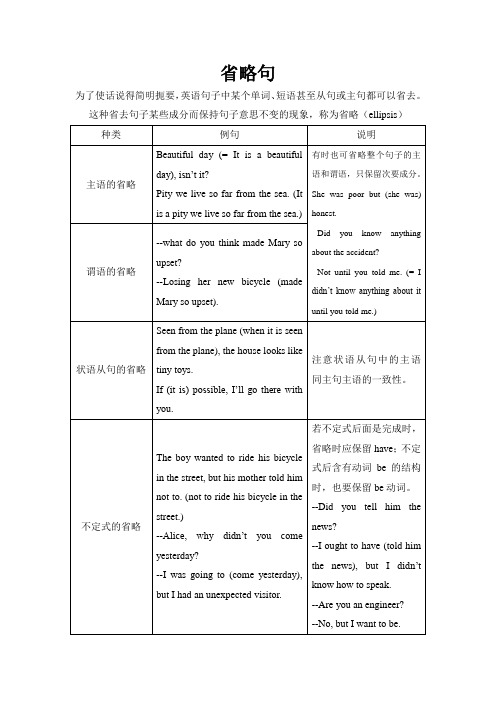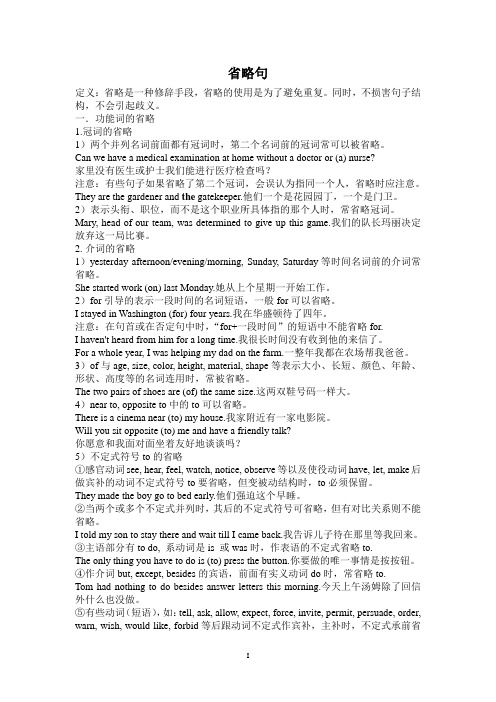英语省略句 课件
英语语法之省略完美课件

3. 状语从句中的省略 (1) When (she was) asked, she didn't answer a word. (2) He likes dogs more than cats. (3) It is colder in Beijing than in Hunan.
精品
4. 名词性从句中的省略 规则1:引导宾语从句的连词that在口语中常常省略
(2)在can not but, can not choose but, can do nothing but…, can't help but…, prefer to do... rather than do…, would rather do…than…之后的动词不定式一 般不带to。
(3)在并列结构中为了避免重复,后一个to省略,如: I'm really puzzled what to think or say.
规则2:省略谓语 在某些特定的环境中,由于语言所指清楚,为了避免重复 ,常将谓语动词省略,留下主语和其他成分;如果谓语部 分全部省略,而只留下主语时,主语代词用宾格,如:(2) 。 — Jack would go to the Expo精n品ext week.
规则3:省略主语和谓语(或谓语的一部分) 在某些具体的场合下,主语和谓语都很明确,于 是为了简单或情感亲切等,可将主语和谓语同时 省略,只剩下表语、宾语、状语或其他成分,如 :(3) Another apple, please.
规则2:小品词to的省略 (1)在see, watch, hear, feel, observe, notice, look at, listen
to等感观动词及使役动词let, make, have 后的“宾语 + 动词不定式作宾语补足语”的结构中,不定式符 号to须省略,但这类结构变成被动语态时,其后的 不定式要还原加上to。 精品
(完整版)高中英语语法省略句

省略句为了使话说得简明扼要,英语句子中某个单词、短语甚至从句或主句都可以省去。
这种省去句子某些成分而保持句子意思不变的现象,称为省略(ellipsis)Ⅰ、状语从句中的省略用法一、如果从句的主语和主句的主语一致,且从句的谓语含有be动词的某种形式(am/is/are/was/were),可同时省略从句的主语和be动词的某种形式。
1、when,while引导的时间状语从句e.g. Do be careful when (you are) crossing the street.When/While (I was) on my way to work, I met her.2、if,unless,once引导的条件状语从句e.g. If (it is) properly treated, waste will do no harm to the environment.I’ll not go to the party unless (I am) invited.Once (you are) caught stealing in a supermarket, you will be punished.3、though,although,whether,no matter whether/what/how/who等引导的让步状语从句e.g. He was happy, though/although (he was) poor.Whether (she is) sick or well, she is always cheerful.No matter how/However hard the task (is), we must fulfill it in time.(注:从句的主语和主句的主语不一致时,只省略从句中的be动词形式)4、as if,as though引导的方式状语从句e.g. He rubbed his eyes and yawned as if/though (he was) waking up after along sleep.He stood up as if/though (he wanted) to leave.(as if/though + to do表示一个将来的动作)二、than,as引导的比较状语从句中的省略用法:当不同的主语进行比较时,一般省略从句中的谓语;当从句中的主语与谓语(be动词除外)和主句中的主语与谓语相同时,通常省略从句中的主语和谓语,只保留比较部分。
英语语法省略句

省略句1)不定式在love, mean, want, like, wish, expect, try, intend, plan, refuse, prefer, seem等动词后面2)在happy,glad,eager,ready,willing等形容词后面。
1.---will you join us?--- I should love to(join you).2.I asked him to see the fil m, but he didn’t want to(see the film).3.--- Would you like to go with us?--- Yes, I’m glad to(go with you)4.He doesn’t get up early as he used to. (get up)注意: 如果不定式中含有be, have(助动词), have been, 通常保留be, have(助动词), have been.1.--- Are you a sailor?--- No, but I used to be.2.---He hasn’t finished yet.---well, he ought to have.1. —I'll be away on a business trip. Would you mind looking after my cat?—Not at all, ________ . (NMET 1995)A. I have no timeB. I'd rather notC. I‘d like itD. I'd be happy to2. —Does your brother intend to study German?—Yes, he intends ________ . (NMET 1998上海卷)A. /B. toC. soD. that5.--- He hasn’t gone to the office up to now.--- Well, he _____.A. shouldB. ought toC. ought to goD. ought to have4. —You should have thanked her before you left.—I meant ________ , but when I was leaving I couldn't find her anywhere. (NMET 2000北京春招卷)A. to doB. toC. doingD. doing to替代词so / not用于避免重复前面所说过的内容。
英语中的省略句

• The problem was a continuous worry to me until it was solved. • Until solved,the problem was a continuous worry to me.
• The young man was listening to music all the time while he was working at the computer.
英语中的省略句பைடு நூலகம்
• 在时间、让步、方式、条件等状语从句中,即由 when、while、although、unless、if、as if等引导 的从句中,如果从句的主语与主句主语一致,或 者主语是it,且在谓语动词中含有be时,常省略从 句的主语和be动词。 • Be careful when(you are)crossing the street.当你 过马路的时候要小心。 • He won’t go to the party unless(he is)invited.除 非收到邀请,否则他不会参加聚会。 •
• He opened his lips as if(he were)to speak.他张开 嘴好像有话说。
• After she learned some simple Chinese,the American girl was able to communicate with the other students in her class. • After learning some simple Chinese,the American girl was able to communicate with the other students in her class.
高中英语语法——省略句(26张PPT)

please.
的一部分)
A: Would you like to
come to the party? B: I’d love to (come the
party).
不定式后 省略动词
They do not visit their parents
as much as they ought to (visit
பைடு நூலகம்
— Well, her parents wouldn’t allow
her to go to the party, but she
still _____.
A. hopes to
B. hopes so
C. hopes not
D. hopes for
(江苏2017)
4. — Have you got any particular
You can borrow my first aid notes if you want to (borrow my first aid notes).
不定式后省略动词
7) Sounds like a good idea. (It) sounds like a good idea.
8) Anything I can do for you? (Is there) anything I can do for you?
5. Sorry to hear that. I’m sorry to hear that.
6. Pity you couldn’t come.
It’s/ What a pity you couldn’t come. 7. This way, please.
Step this way, please.
英语特殊句式-倒装句,省略句,强调句

英语特殊句式-倒装句,省略句,强调句(总22页)--本页仅作为文档封面,使用时请直接删除即可----内页可以根据需求调整合适字体及大小--★特殊句式★倒装(1)一、倒装倒装句可分下列三种:(1) 动词 + 主词(2) 助动词(do, does, did) + 主词 + 原形动词 (一般疑问句的句型)(3) 助动词(will, can, should) + 主词 + 原形动词(1) 否定字放句首否定字 + ⎩⎨⎧+++原形动词主词助动词主词动词be be 动词才能拿到主词前面,一般动词要在主词前面加助动词。
否定字就是从中文解释去判断其是否有否定的意思,Never 绝不,hardly 几乎不。
is never late for school.=> Never is he late for school.本句的late 是形容词,它跟在表示状态的be 动词后面。
否定字在句首的时候,后面要接倒装句。
He never goes to school late.=> Never does he go to school late.本句的late 是否次,它修饰一般动词goes 。
翻译:他上学从不迟到。
late 形容词和副词都是一样的写法,所以说上学不迟到有以上两种说法。
倒装句中,一般动词不能放在主词前面,主词前面只能用助动词且动词要变成原形。
rarely tells a joke.=> Rarely does he tell a joke.翻译:他很少说笑话。
rarely 是个否定的频率副词,表“很少的”。
have never seen such beautiful scenery.=> Never have I seen such beautiful scenery.翻译:我从来没有看到过如此美丽的景象。
have 在这里就是一个助动词,景象不可数不能在其前面加不定冠词a 或定冠词the 。
高中英语语法精讲——省略句

省略句定义:省略是一种修辞手段,省略的使用是为了避免重复。
同时,不损害句子结构,不会引起歧义。
一.功能词的省略1.冠词的省略1)两个并列名词前面都有冠词时,第二个名词前的冠词常可以被省略。
Can we have a medical examination at home without a doctor or (a) nurse?家里没有医生或护士我们能进行医疗检查吗?注意:有些句子如果省略了第二个冠词,会误认为指同一个人,省略时应注意。
They are the gardener and the gatekeeper.他们一个是花园园丁,一个是门卫。
2)表示头衔、职位,而不是这个职业所具体指的那个人时,常省略冠词。
Mary, head of our team, was determined to give up this game.我们的队长玛丽决定放弃这一局比赛。
2.介词的省略1)yesterday afternoon/evening/morning, Sunday, Saturday等时间名词前的介词常省略。
She started work (on) last Monday.她从上个星期一开始工作。
2)for引导的表示一段时间的名词短语,一般for可以省略。
I stayed in Washington (for) four years.我在华盛顿待了四年。
注意:在句首或在否定句中时,“for+一段时间”的短语中不能省略for.I haven't heard from him for a long time.我很长时间没有收到他的来信了。
For a whole year, I was helping my dad on the farm.一整年我都在农场帮我爸爸。
3)of与age, size, color, height, material, shape等表示大小、长短、颜色、年龄、形状、高度等的名词连用时,常被省略。
省略句(英语)

定义:为了避免重复,省略句中的一个或 几个成分,这种语法现象称为“省略”。
英语中省略现象较为普遍,对省略的考查已成 为高考中的热点。句子成分的省略,可分为以下 7种情况:
1.省略主语,主谓语或主谓的一部分 2.不定式符号to的省略 3.不定式结构中动词的省略 4.状语从句中的省略 5.定语从句中关系词的省略 6.虚拟语气中if和should的省略 7.not, so, neither, nor 的“替代性”省略
3. Sounds like a good idea. (It) sounds like a good idea. 4. Anything I can do for you? (Is there) anything I can do for you?Βιβλιοθήκη 省略主语,主谓语或主谓的一部分
(1) (I) Beg your pardon. 省略主语 (2) (It) Sounds like a good idea. (1) (Is) Anybody here? (2) (Is there) Anything I can do 省略谓语或谓 语的一部分 for you?
简单句中的省略
1、省略主语 祈使句中主语通常省略;其 它省略主语多限于少数现成的说法。 (1) (I) See you tomorrow.
(2) (It) Doesn’t matter.
2、省略主谓或主谓语的一部分 (1) (There is) No smoking .
(2) (Will you) Have a smoke ?
(1) (Are you) Hungry? (2) (I want) Orange juice, please.
省略主语 和谓语
- 1、下载文档前请自行甄别文档内容的完整性,平台不提供额外的编辑、内容补充、找答案等附加服务。
- 2、"仅部分预览"的文档,不可在线预览部分如存在完整性等问题,可反馈申请退款(可完整预览的文档不适用该条件!)。
- 3、如文档侵犯您的权益,请联系客服反馈,我们会尽快为您处理(人工客服工作时间:9:00-18:30)。
3. Why are the functions of the skin described as _c_o_m__p_le_x_? It keeps you warm or cool; it prevents your body from losing too much water and provides you with your _s_e_n_s_e_ of touch.
bandage unbearable in place blisters ankle
over and over again scissors squeeze out temporary cupboard
Emma had a mild accident. She burned her _a_n_k_le_ when she knocked some hot liquid over herself. At first the pain was u_n_b_e_a_r_a_b_l_e but fortunately Luke knew what to do. He immediately provided some t_e_m__p_o_r_a_ry_ treatment using some cloths from the __cu__p_b_o_a_r_d_. He wetted them, _s_q_u_e_e_z_e_d__o_u_t__ the cold water and then placed them over her ankle.
人教课标版 高二必修5 Unit 5
Learning about Language
1 Complete the tables with the correct nouns, verbs or adjectives.
Verb injure swell bleed sprain poison
Noun
6. What are the _s_y_m_p__to_m__s_ of first degree burns? They are dry, red and mildly _sw__o_ll_e_n_.
3 Complete the passage using the words or phrases provided in their proper forms.
Adjective
injury swelling
injured swollen
blood/bleeding bloody/bleeding
sprain
sprained
poison
poisonous
Verb vary organize choke water infect
Noun variety organ choke water infection
Grammar – Ellipsis (省略)
为了使语言简洁或避免重复, 省略句中的一 个或几个句子成分, 这种语法现象称为省略。
(1) (I) Beg your pardon.
(2) (It) Sounds like a good idee? (2) (Is there) Anything I
4. What can hurt the _t_i_ss_u_e_ of the skin? Hot _l_iq_u_i_d_ from pans on the stove; electric shocks, radiation, fire and the sun.
5. What is it _v_i_ta_l_ to do if you have third degree burns? Go to the hospital.
can do for you?
谓语或谓语 的一部分
A: Where has Mr Smith
gone? B: Sorry, I don’t know
宾语
(where he has gone.)
(1) (Are you) Hungry? 主语和谓语
(2) (I want) Orange juice, (或主语和谓语
Adjective various organic choked watery
infected/infectious
2 Complete the sentences with new words or phrases from the unit.
1. When do you need to use your knowledge about __f_ir_s_t__ __a_id___? When somebody suddenly _f_a_ll_s_ __il_l _ or has an accident.
He did this _o_v_e_r_a_n_d__o_v_er__a_g_a_in__ until the pain disappeared. Then he dried the ankle gently to prevent _b_li_s_te_r_s_ from forming. Finally he took a pair of _sc_i_s_so_r_s and cut a _b_a_n_d_a_g_e_ to the right length. Then he tied it tightly so that it would stay _i_n_p_l_a_c_e_. Emma was very grateful to Luke for what he had done for her.
please.
的一部分)
A: Would you like to come to the party?
